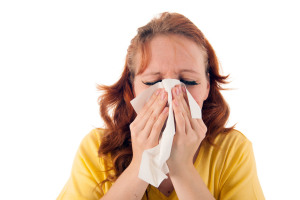Q. I had a sinus infection this past week. I have felt really guilty about not exercising. Should I exercise if I’m sick? –Josh
A. Thanks for the question, Josh, and I hope you’re feeling better! Feeling ill is never a fun experience, but it happens to all of us. Cold and flu season starts as the weather begins to turn. I’ll first address the reasons why we tend to experience more illnesses during this time of year, and then I’ll offer guidelines to determine if exercising while sick is the best choice for you.
Why do I tend to get sick during the winter?
- Decreased sun exposure as there are fewer daylight hours. With less sun exposure, the body isn’t able to produce the same amount of vitamin D as it did during the summer months. Vitamin D is a powerful antioxidant that helps prevent illness. Consider supplementing with vitamin D during the winter months.
- Decreased ultraviolet radiation from the sun allows viruses and bacteria to live longer on surfaces. Consider frequently cleaning your cell phone, keyboards, door knobs, and remote controls to avoid exposure. Wash your hands frequently and teach your children proper hygiene.
- Dry conditions lead to dried out mucous membranes. The colder temperatures tend to be the driest times during the year. Drier conditions can lead to dried out mucous membranes which exposes and damages them. Then the mucous membranes can’t optimally function as a physical barrier to virus or bacteria exposure. Consider using a humidifier in your home during the winter months.
- As children head back to school and more people spend time indoors, the close quartered contact allows for easy transmission of illness. In the U.S.A., the winter months include major holidays, which mean more shopping and gathering together. You may be exposed to many people who are ill. Once again, wash your hands frequently and teach your children proper hygiene.
Should I exercise if I’m sick?
A small amount of activity or exercise can actually boost the immune system, but a heavy amount can actually lower your immune system in the short run. Follow these guidelines to determine if exercising while sick is the best choice for you:
- How sick are you? Determine the severity of your illness. If you have a fever or may be contagious, it’s your responsibility to not spread the illness. Stay away from others. If you have an upper respiratory illness, I recommend that you don’t perform any heavy cardiovascular exercise as you run the risk of driving the illness further down into the lungs.
- Listen to your body. How are you feeling? If you’re just a little under the weather, light activity might actually help you. If you’re too tired to get out of bed, listen to your body and rest. You need to support your immune system in every way you can. Don’t feel guilty about not exercising! A missed work out will not completely derail your training program. Remember, quality over quantity.
- Take the time to cross train. An illness is an excellent time to perform light cross training. Take a break from your regular exercise routine with active rest. Take a few walks or perform yoga at home. Focus on your problem areas. When I’m not feeling well, I concentrate on performing back strengthening exercises. Is your knee, low back, or shoulder bothering you? Now may be a good time to start a rehabilitation program. Please refer to the following posts to get started: 7 Tips to Get Rid of Knee Pain, How to Safely Self-Treat Low Back Pain, and How Should I Treat Shoulder Pain and Impingement?
- Don’t expose others just so you can get your work out in! If you are coughing, sneezing, or have a fever, you’re likely contagious. Please don’t spread it around! If you insist upon exercising, then exercise in your home or outside. Be mindful of others and always clean the exercise equipment at the gym after working out.
- Stay hydrated. Regardless of illness, it’s important to stay hydrated. Colder air can be very dry and can lead to dehydration. Prevent illness during the winter months by drinking extra fluids.
Did you know that as you get older, you tend to experience fewer colds? Your immune system is more geared to fight the cold after many years of practice. You can more easily recognize those who are sick and stay clear. You make wiser choices such as frequent hand washing and less sharing of personal items and food. (Teach your children how to prevent spreading germs as well.) Unfortunately, we can’t avoid getting sick every time. When you are sick, use the guidelines noted above to determine if exercising is the best choice for you. Thanks for your question, Josh!
Do you exercise if you’re sick? Can you offer any tips on how to quickly recover from an illness? Please leave your comments below.
If you have a question that you would like featured in an upcoming blog post, please comment below or submit your question to contact@thePhysicalTherapyAdvisor.com. Be sure to join our growing community on Facebook by liking The Physical Therapy Advisor!
Disclaimer: The Physical Therapy Advisor blog is for general informational purposes only and does not constitute the practice of medicine or other professional health care services, including the giving of medical advice. No health care provider/patient relationship is formed. The use of information on this blog or materials linked from this blog is at your own risk. The content of this blog is not intended to be a substitute for professional medical advice, diagnosis, or treatment. Do not disregard, or delay in obtaining, medical advice for any medical condition you may have. Please seek the assistance of your health care professionals for any such conditions.

